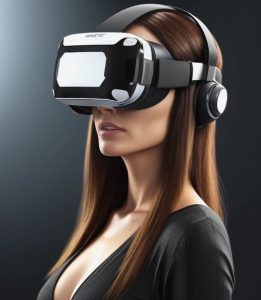Virtual reality (VR) is no longer just a futuristic dream depicted in science fiction movies. It has become a vibrant and rapidly growing part of the entertainment industry. As technology advances, VR is transforming how we experience games, films, concerts, and even social interactions. Let’s dive into the world of virtual reality entertainment and explore how it’s revolutionizing our experiences.
Virtual reality has come a long way since its inception. Early VR systems in the 1960s and 1970s were cumbersome and expensive, limiting their use to specialized fields like aviation and military training. However, with the advent of powerful smartphones and affordable headsets like the Oculus Rift, HTC Vive, and PlayStation VR, VR has become accessible to a broader audience.
This democratization of VR technology has spurred a wave of innovation, allowing developers and content creators to push the boundaries of what’s possible in entertainment.
One of the most significant impacts of VR has been on the gaming industry. VR games offer players an unprecedented level of immersion, transporting them to fantastical worlds where they can interact with their surroundings in ways that traditional gaming simply can’t match.
Imagine stepping into the shoes of a superhero, flying through a cityscape, or exploring ancient ruins in search of hidden treasures. VR gaming provides a sense of presence and interactivity that enhances the overall experience, making it more engaging and memorable.
Virtual reality is also reshaping the film industry. Filmmakers are experimenting with 360-degree videos and VR storytelling to create immersive narratives that place viewers at the center of the action. Instead of passively watching a movie, audiences can become active participants, exploring scenes and interacting with characters.
This new form of storytelling opens up endless creative possibilities, allowing filmmakers to craft experiences that are more personal and impactful. From documentaries that take you to remote corners of the world to interactive mysteries where you solve the crime, VR is adding a new dimension to cinematic storytelling.
VR technology is transforming how we experience live events like concerts, sports, and theater performances. With VR headsets, fans can enjoy a front-row seat from the comfort of their homes. Whether it’s watching your favorite band perform on stage or experiencing the thrill of a live sports match, VR brings the excitement and atmosphere of live events right to your living room.
This accessibility not only broadens the audience reach but also creates opportunities for artists and performers to engage with fans in innovative ways. Virtual meet-and-greets, interactive performances, and exclusive behind-the-scenes content are just a few examples of how VR is enhancing the live event experience.
Virtual reality is not just about individual experiences; it’s also transforming how we connect with others. Social VR platforms like VRChat, AltspaceVR, and Facebook Horizon allow users to meet and interact in virtual spaces, creating a new form of social interaction.
These virtual environments provide a sense of presence and community, enabling people to hang out, play games, attend events, and collaborate on projects in a shared digital space. As VR technology continues to evolve, it has the potential to redefine how we build relationships and connect with others.
As VR technology continues to advance, its impact on the entertainment industry will only grow stronger. The integration of augmented reality (AR) and mixed reality (MR) will further blur the lines between the physical and digital worlds, offering even more immersive and interactive experiences.
Looking ahead, we can expect to see VR becoming an integral part of everyday life, with applications beyond entertainment, such as education, healthcare, and virtual tourism. The possibilities are endless, and the journey is just beginning.
Virtual reality is not just a technological trend; it’s a revolution in the way we experience entertainment. From gaming and movies to live events and social interaction, VR is reshaping our world and opening up new frontiers of creativity and connection. As we continue to explore the potential of this immersive technology, the future of entertainment looks incredibly exciting.

